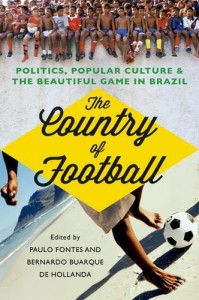FIFA World Cup 2014 – Thursday 12 June 2014
Yes, this summer England will be hosting the opening three stages of the Tour de France and yes, Scotland will be hosting the Commonwealth Games, but the ‘big’ event of the year is that taking place in Brazil – the 20th FIFA World Cup.
What drama will unfold over the 64 games of the tournament? Will it be remembered for events on the pitch or will the demonstrations that were a feature of the Confederations Cup last year come back to haunt the Brazilian authorities? Will the stench of the recent Qatar 2022 bribery allegations linger?
The fact is that the build-up to the World Cup has not been an easy one and FIFA and the Organising Committee will hope that it all runs to plan, with the International Olympic Committee taking a keen interest with the 2016 Games in Rio on the horizon. Have no fear the Blatter publicity machine will make sure the world knows that the event was a ‘triumph’. The most corrupt man in a sick circus that rolls into town every four years.
But I digress…
Brazil has hosted the World Cup before, that being back in 1950. As host nation Brazil made it to the Final, but the perfect ending never materialised, as Uruguay shocked their South American neighbours winning the game 2-1. The shock of that loss was partly expunged when Brazil beat Uruguay during the Groups Stages of the 1970 World Cup, but may only be fully laid to rest if they can win the competition in the revamped Maracana later this month. Now 64 years later, the weight of expectation will once again fall upon the Brazilians. Will the pressure prove too much or will they rise to the challenge to take the title for a sixth time? Which Brazil will turn up? Will it be the one full of the glorious skills of the teams of 1970 and 1982, or will it be the cynical teams that graced the World Cups in 1974 and 1978 and lost its head in 2010?
Well today the journey begins as Brazil take on Croatia. Brazil qualified for the tournament as hosts, whilst Croatia had a little bit of work to do to reach the Finals. Croatia were in Group A from which Belgium emerged winners and took the automatic qualification place. Croatia went into the Play-offs for the eight Group Runners-up with the best record and were drawn against Iceland over two-legs. The first game in Reykjavik ended 0-0, but a place in the Finals was secured with goals from Mario Mandzukic and Darijo Srna.
Whilst the Brazilian squad is littered with familiar faces from England and the rest of Europe (only four of the squad play for Brazilian clubs), the Croatian squad might not be quite so well known to the English audience. Defender Dejan Lovren has been at Southampton this season, whilst Nikica Jelavic has been plying his trade at Hull City, but those are the only players currently in the English Premier League. Others who have dallied with the EPL and all bizarrely with a North London connection include Stipe Pletikosa who played a single League Cup game for Spurs (against Arsenal) in 2010/11, defender Vedran Corluka who had spells at Manchester City and Spurs, midfielder Luka Modric who also played at White Hart Lane and Eduardo who had a spell up the road with ‘The Arsenal’.
Back in 1950, Brazil opened the competition with a 4-0 win over Mexico. Whilst I can’t see a repeat of that score in 2014, a 3-1 win for the host nation is not out of the question.
 When many people think of Brazil, they conjure up images of a joyful mix of football, samba, carnival and beaches and therefore maybe puzzled by the demonstrations that have occurred in the preparation and build-up to the World Cup. The reality is that Brazil is a complicated country which as the introduction to The Country of Football says, “…stems from its explosive growth, and the struggles to adapt economics, social and political institutions to the new realities of the country…”.
When many people think of Brazil, they conjure up images of a joyful mix of football, samba, carnival and beaches and therefore maybe puzzled by the demonstrations that have occurred in the preparation and build-up to the World Cup. The reality is that Brazil is a complicated country which as the introduction to The Country of Football says, “…stems from its explosive growth, and the struggles to adapt economics, social and political institutions to the new realities of the country…”.